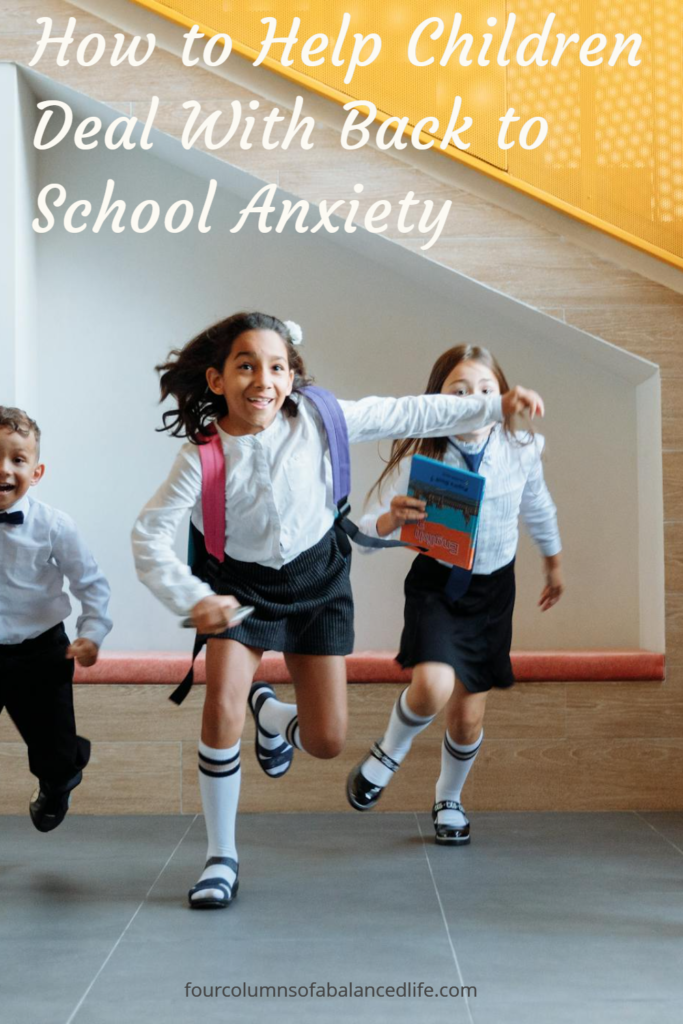Back To School Anxiety

Helping children cope with back-to-school anxiety involves addressing their concerns, providing support, and creating a positive environment. It is important to encourage your child to express their feelings and concerns about going back to school. Listen actively without judgment and validate their emotions. Be approachable and create an open space for them to share their thoughts. Visit the school before the first day to familiarize your child with the environment. I recommend reintroducing a school-year routine a few weeks before school starts. Communicate the positive aspects of going back to school, such as reuniting with friends, learning new things, and engaging in fun activities. Involve your child in shopping for school supplies and picking out a backpack or lunchbox. This helps build excitement and a sense of readiness. Practice common school scenarios, such as introducing themselves, asking for help, or navigating the school building. This will help your child with back-to-school anxiety.
Valerie is a graduate of English and Japanese from U.C. Berkeley. Valerie has been in education for over 15 years. She has taught all age groups: pre-k, kinder, elementary, middle school, and high school. She has always wanted to be an educator from a young age and has taught English in Japan.
Valerie talks to me about her experience in Japan, the U.S. educational system, and how it can be revitalized and back to school anxiety.
Walk me through what you learned in Japan and how that experience shaped you.
Flash forward to 2010, and I finally applied to an English language school in Japan – just before the Tohuku earthquake. I was accepted to teach at an English school in Nagoya, Japan. I worked there for a while and met great people. I learned a lot about how Japan teaches English to its students. It was a valuable experience, but I wanted to work at a school. That’s when I found the international school.
I spent about eight years in Japan. I served on the curriculum committee and taught children’s theatre, p.e., science, math, and English. It was a transformative experience for me. I became a teacher.
Our kindergarteners were reading at a third-grade reading level. They didn’t sit in chairs for extended periods either. They played. We danced. They wrote fun stories. I didn’t know children were capable of reading at such a young age, but they are.
Help me understand why you want to revitalize education and what part.
I returned to the United States in 2018. I was selected to open a school in Honolulu, so in 2018, I moved to Hawaii. I did everything from the ground up. I worked closely with licensing, hired the staff, and created the business paperwork. It was a challenging but rewarding experience. I met some great people. Unfortunately, in 2019, my mother fell ill, and I decided to move back to Los Angeles.
If you’re noticing the timeline, this happened just before Covid hit. In a way, I was lucky because I was in a unique position to earn my teaching credential during the lockdown. I appreciated all I learned in the credentialing program, but I think the education system in America is lacking.
I had some great mentors and met highly motivated colleagues in the program, many of whom are great teachers. There’s nothing wrong with the people who serve in education, but I think there is a problem with how we view education and the expectations for educators.
We (teachers) don’t ever stop working. That’s a generalization, but I am in many different teacher groups, and teachers are always asking about their students, ways to help them do this or that, ways to teach various ideas, and seeking support from parents. Teaching is a profession, a career.
I want to revitalize education, not just for teachers but for our society. In many ways, I don’t think we optimize learning for anything other than testing. We need to optimize learning (and teaching) for long-term retention.
At the same time, we change the way society views teachers. We have a unique skill set. We spend years training, and our training continues every year.
We need to reframe and energize education to revitalize it using what I’ve learned in Japan and in other countries I’ve studied.
How does reading help our children?
Reading enhances a child’s vocabulary, language skills, and comprehension abilities. According to a study by the American Academy of Pediatrics, reading to young children is critical for their language development and readiness for academic success. Additionally, reading fosters imagination and creativity. It opens up new worlds and perspectives, allowing children to explore different cultures, ideas, and emotions. Reading also improves concentration and discipline, as it requires focus and mental engagement. It is also a source of comfort and relaxation, offering a healthy escape and a way to manage stress.
You talk a lot about back-to-school anxiety. How can we help our children deal with anxiety?
Each school year brings a new set of challenges for children. Children experience separation anxiety and have anxiety over friendships and newness. If we recognize the signs early, we can get ahead of it, and help kids prepare for their new environment.
Establishing a routine before school starts and gradually adjusting bedtimes and meal times to match the school schedule will help children adjust.
Open communication is key. Encourage children to express their feelings and concerns. There are lots of books available for kids starting school. Reading them together can help alleviate stress and anxiety.
For example, parents and caretakers can take a tour of the school. Kids can see the school and maybe even meet their new teacher.
Parents can write a note for their kids and leave it in their lunchbox or prepare something special for snack time.
Additionally, maintaining a positive attitude about school and learning can be contagious; children often mirror the attitudes of adults around them.

Please tell me a little about the city you live in and the food scene.
I live in South Pasadena, CA. It’s retained the small-town feel, and I would say it’s pretty different from other areas.
You’ll find a range of cuisines, from traditional American to Asian, Mexican, and beyond. We have a great place that makes Japanese riceballs. We also have a family-owned Hawaiian restaurant. And pastries! We have excellent bakeries in South Pasadena!
The city hosts various farmers’ markets offering fresh, local produce. I go every Thursday. The food is delicious.
South Pasadena’s commitment to supporting local businesses means that many of these eateries are unique and offer a personal touch in their service and menu offerings. It’s a great place to visit.
In your own words, what does women’s empowerment mean to you?
Women’s empowerment means providing women with equal access to education, healthcare, employment, and political spaces. It’s not just about providing opportunities but also respecting and valuing women’s choices, whether in pursuing careers, raising families, or both.
Empowerment is also about giving women the tools and confidence to voice their opinions in all aspects of society. It’s a commitment to creating an environment where we recognize women’s rights as human rights.
